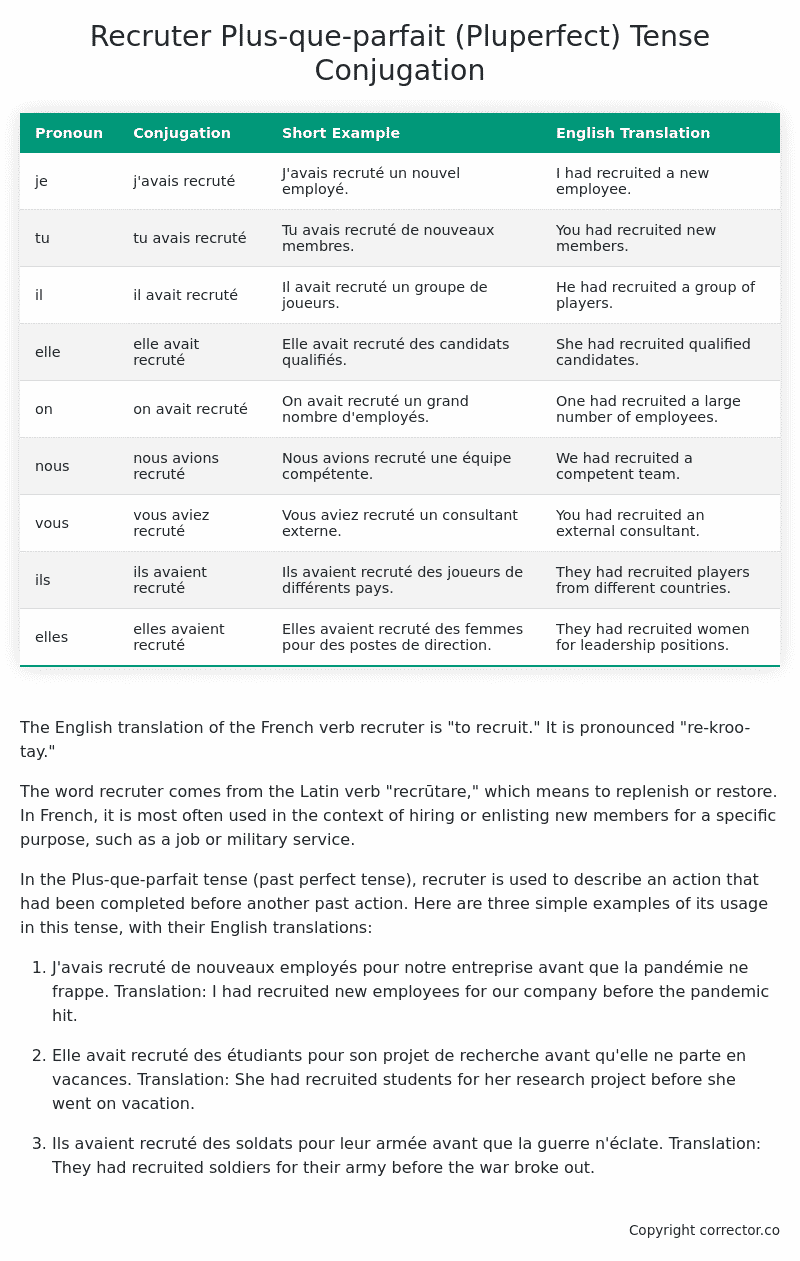Plus-que-parfait (Pluperfect) Tense Conjugation of the French Verb recruter
Introduction to the verb recruter
The English translation of the French verb recruter is “to recruit.” It is pronounced “re-kroo-tay.”
The word recruter comes from the Latin verb “recrūtare,” which means to replenish or restore. In French, it is most often used in the context of hiring or enlisting new members for a specific purpose, such as a job or military service.
In the Plus-que-parfait tense (past perfect tense), recruter is used to describe an action that had been completed before another past action. Here are three simple examples of its usage in this tense, with their English translations:
-
J’avais recruté de nouveaux employés pour notre entreprise avant que la pandémie ne frappe.
Translation: I had recruited new employees for our company before the pandemic hit. -
Elle avait recruté des étudiants pour son projet de recherche avant qu’elle ne parte en vacances.
Translation: She had recruited students for her research project before she went on vacation. -
Ils avaient recruté des soldats pour leur armée avant que la guerre n’éclate.
Translation: They had recruited soldiers for their army before the war broke out.
Table of the Plus-que-parfait (Pluperfect) Tense Conjugation of recruter
| Pronoun | Conjugation | Short Example | English Translation |
|---|---|---|---|
| je | j’avais recruté | J’avais recruté un nouvel employé. | I had recruited a new employee. |
| tu | tu avais recruté | Tu avais recruté de nouveaux membres. | You had recruited new members. |
| il | il avait recruté | Il avait recruté un groupe de joueurs. | He had recruited a group of players. |
| elle | elle avait recruté | Elle avait recruté des candidats qualifiés. | She had recruited qualified candidates. |
| on | on avait recruté | On avait recruté un grand nombre d’employés. | One had recruited a large number of employees. |
| nous | nous avions recruté | Nous avions recruté une équipe compétente. | We had recruited a competent team. |
| vous | vous aviez recruté | Vous aviez recruté un consultant externe. | You had recruited an external consultant. |
| ils | ils avaient recruté | Ils avaient recruté des joueurs de différents pays. | They had recruited players from different countries. |
| elles | elles avaient recruté | Elles avaient recruté des femmes pour des postes de direction. | They had recruited women for leadership positions. |
Other Conjugations for Recruter.
Le Present (Present Tense) Conjugation of the French Verb recruter
Imparfait (Imperfect) Tense Conjugation of the French Verb recruter
Passé Simple (Simple Past) Tense Conjugation of the French Verb recruter
Passé Composé (Present Perfect) Tense Conjugation of the French Verb recruter
Futur Simple (Simple Future) Tense Conjugation of the French Verb recruter
Futur Proche (Near Future) Tense Conjugation of the French Verb recruter
Plus-que-parfait (Pluperfect) Tense Conjugation of the French Verb recruter (this article)
Passé Antérieur (Past Anterior) Tense Conjugation of the French Verb recruter
Futur Antérieur (Future Anterior) Tense Conjugation of the French Verb recruter
Subjonctif Présent (Subjunctive Present) Tense Conjugation of the French Verb recruter
Subjonctif Passé (Subjunctive Past) Tense Conjugation of the French Verb recruter
Subjonctif Imparfait (Subjunctive Imperfect) Tense Conjugation of the French Verb recruter
Subjonctif Plus-que-parfait (Subjunctive Pluperfect) Tense Conjugation of the French Verb recruter
Conditionnel Présent (Conditional Present) Tense Conjugation of the French Verb recruter
Conditionnel Passé (Conditional Past) Tense Conjugation of the French Verb recruter
L’impératif Présent (Imperative Present) Tense Conjugation of the French Verb recruter
L’infinitif Présent (Infinitive Present) Tense Conjugation of the French Verb recruter
Struggling with French verbs or the language in general? Why not use our free French Grammar Checker – no registration required!
Get a FREE Download Study Sheet of this Conjugation 🔥
Simply right click the image below, click “save image” and get your free reference for the recruter Plus-que-parfait tense conjugation!

Recruter – About the French Plus-que-parfait (Pluperfect) Tense
Tense Formation
Common everyday usage patterns
Sequencing of past events
Background information
Hypothetical or reported speech
Interactions with other tenses
Summary
I hope you enjoyed this article on the verb recruter. Still in a learning mood? Check out another TOTALLY random French verb conjugation!


